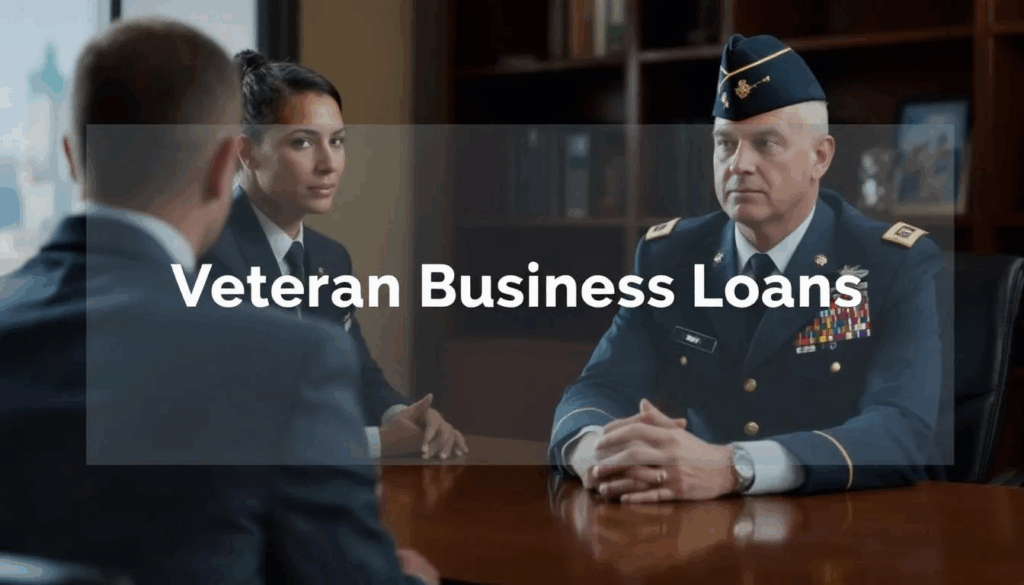What are Veteran Business Loans?
Veterans’ business loans are financing options specifically designed to support military veterans, service-disabled veterans, active-duty service members, reserve members, National Guard members, and, in some cases, their family members. These loans provide working capital, funds to purchase equipment, or cash flow support for starting or expanding a business. Loan programs may come from the Small Business Administration (SBA), banks, credit unions, or alternative lenders.
Veteran entrepreneurs may benefit from lower upfront costs due to reductions or waivers of fees on loans under $1 million. These fee reductions, combined with favorable interest rate terms, can make business loans more accessible to veteran small business owners compared to traditional financing.
Overall, loans for veterans help bridge the gap between a strong business idea and the financial capital needed to bring it to life.
Why do Veterans struggle to secure Business Financing?
While veterans possess many strengths as entrepreneurs, they face unique challenges in securing business financing. Many transitioning service members leave the military with limited personal savings or credit history, making it difficult to meet bank requirements. Gaps in employment caused by deployment or active duty can also hurt credit scores.
Traditional small business loans often require strong financial statements, collateral, or years of business history. For newly established veteran-owned businesses, these requirements can be challenging to meet.
Additionally, unfamiliarity with loan programs, business training, or the application process can create additional barriers. As a result, many veteran entrepreneurs turn to specialized loans for veterans or SBA-backed loans that offer more flexible underwriting standards.
What Business Loans are available to Veterans?
Veterans’ business loans work in much the same way as other small business loans, but with added benefits such as reduced upfront guaranty fees, flexible terms, and SBA resources tailored to veterans. Here are the most common loan options:
Business Term Loans
Business term loans provide a lump sum of capital that is repaid over a set schedule with interest. They are handy for funding long-term investments such as purchasing large equipment, expanding facilities, or meeting major working capital needs. For veteran entrepreneurs, term loans offer the stability of predictable monthly payments, helping them plan for growth or business expansion with confidence.
Business Lines of Credit
A business line of credit gives flexible access to funds when needed. Unlike a lump-sum loan, veterans can draw money as required and only pay interest on the amount they use. This type of financing is ideal for managing cash flow, handling unexpected expenses, or covering short-term operational needs without committing to a fixed repayment schedule.
Equipment Financing
Equipment financing enables veteran-owned businesses to acquire or upgrade essential machinery, vehicles, or technology, using the purchased asset as collateral. This reduces lender risk while providing businesses with the tools needed to increase efficiency and support growth initiatives, whether it’s for manufacturing, construction, or technology upgrades.
Merchant Cash Advances
Merchant cash advances provide upfront capital in exchange for a percentage of future sales. While this option can be accessed quickly and with minimal paperwork, it often comes with higher fees or costs. Veterans may find it helpful in bridging short-term gaps in cash flow, but it’s best suited for urgent needs rather than long-term financing.
Receivables Factoring
Receivables factoring allows businesses to sell unpaid invoices at a discount to receive immediate cash. This is particularly helpful for veterans who work with government contracts or clients that have slow payment cycles. By turning receivables into instant working capital, businesses can maintain steady operations and meet obligations without waiting for invoices to be paid.
SBA Loans
SBA loans offer veterans lower fees, competitive interest rates, and flexible repayment terms. The SBA 7(a) loan is the most versatile lending option for veterans seeking funds for general business purposes. These loans are designed to reduce lender risk, making it easier for eligible veterans to secure financing and build or expand their businesses.
Working Capital Loans
Working capital loans help veteran-owned businesses cover everyday operational expenses such as payroll, rent, inventory, and other short-term obligations. These loans provide stability, ensuring that businesses can maintain operations smoothly while focusing on long-term growth strategies.
Revenue Based Business Loans
Revenue based business loans allow repayments to be tied to a percentage of monthly revenue rather than fixed amounts. This flexible structure benefits businesses with seasonal or fluctuating income, as veterans can make payments in line with cash flow, reducing stress on the business during slower months.
What are the qualifications for Veterans Business Loans?
Eligibility for veteran business loans depends on the type of financing and the lender. Here are three standard sets of qualifications:
Traditional Business Loans
Banks and credit unions typically require strong credit scores, consistent cash flow, and detailed financial statements. Collateral or personal guarantees may also be required.
SBA Loans
SBA-backed loans require veteran status, an honorable discharge, and a solid business plan. Applicants must complete forms such as DD Form 214 and meet Small Business Administration (SBA) size standards.
Alternative Business Loans
Online and alternative lenders often offer more flexible requirements. They may approve loans for veterans based on cash flow, business goals, and revenue history rather than perfect credit.
How to apply for a Veteran Business Loan:
You can apply for an alternative business loan or start the SBA loan application process with our one-page application. Follow these steps to apply.
Step 1: Determine the right loan for your business needs.
We usually recommend the loan options that feature the most uncomplicated repayment terms for your cash flow.
Step 2: Gather your documents.
The following documentation requirements are based on SBA loans. Most alternative business loans have fewer requirements.
Be prepared to provide:
- Proof of veteran, reservist, or National Guard status with the correct Department of Defense form and any corresponding documentation.
- Driver’s License
- Business license or certificate
- Voided Business Check (for business bank account information)
- Bank Statements
- Credit Report/Statement of Personal Credit History
- Business Tax Returns
- Credit Card Processing Statements
- Personal Tax Returns – 3 Years
- Business Tax Returns – 3 Years
- Business Plan (Not in all cases)
- Personal Financial Statement
- List of Real Estate Owned or Business Leases, if applicable
- Debt Schedule/Loan/Rent/Lease Documentation
- Deeds/Title/Ownership documentation for any collateral/Security
- Current Profit & Loss Statements and Balance Sheet Year-to-Date
- A/R and A/P Reports
Step 3: Fill out the application.
You can begin the application process by calling us or filling out our one-page online application. Either way, you’ll be asked to enter the information from the previous section along with your desired funding amount.
Step 4: Speak to a representative.
Once you apply, a representative will contact you to explain the repayment structure, rates, and terms of your available options. This way, you won’t have to worry about any surprises or hidden fees during repayment.
Step 5: Receive approval.
SBA Loans through our network generally take 3-5 weeks to process. Once approved and your file is closed, funds should appear in your bank account in a few business days.
All other loans have a much shorter approval and funding time. Depending on the type of loan, funds should appear in your bank account in 1-3 business days for most funding options.
What are the benefits of Veterans Business Loans?
Veterans’ business loans provide several advantages, including reduced upfront guaranty fees, lower interest rate terms, and more flexible repayment schedules. SBA programs, in particular, are designed to support veterans through additional resources like business training and contracting opportunities.
Access to capital allows veteran business owners to purchase equipment, hire staff, and cover working capital needs without straining personal finances. Additionally, some lenders and programs actively support Veterans’ Affairs initiatives, meaning military veterans can benefit from dedicated loan options and tailored application processes.
What are the drawbacks of Veterans Business Loans?
While these loans offer many benefits, they also have potential drawbacks. The application process can be time-consuming, especially for SBA resources that require extensive documentation, such as financial statements, business plans, and proof of veteran status.
Approval is not guaranteed, and some loan programs may require personal guarantees or collateral. Additionally, certain loan options like merchant cash advances or revenue-based loans can come with higher costs compared to traditional financing.
Veterans Business Loans Pros & Cons
Pros:
- Lower upfront guaranty fee and interest rate.
- Access to SBA programs and SBA resources.
- Flexible loan options for various business needs.
- Dedicated support for eligible veterans and military spouses.
Cons:
- Lengthy application process and documentation requirements.
- Approval challenges for new business owners.
- Some loan options have higher financing costs.
Frequently Asked Questions
Here are the most common questions about business loans for veterans.
Are there Government-Backed Business Loans for Veterans?
The Small Business Administration plays a critical role in supporting veteran entrepreneurs through SBA-backed loans and resources. The SBA operates Veterans Business Outreach Centers (VBOCs) nationwide to support veteran entrepreneurs. Veteran small business owners have access to two primary SBA business loan programs: the SBA 7(a) loan and the SBA 504 loan. Veterans may qualify for reduced or waived guaranty fees on SBA 7(a) loans, significantly lowering upfront costs.
To qualify for a Veteran SBA loan, veterans must have served in the U.S. military and received an honorable discharge. In addition to funding, the SBA also provides business training, contracting opportunities, and SBA resources that help support veteran-owned businesses. The federal government awards an annual portion of its contracting dollars to veteran-owned companies.
How can Veteran Business Owners use the Loan funds?
Veterans can use a veteran business loan for nearly any business need, including working capital and equipment purchases. Funds can be used to purchase inventory, cover payroll, expand facilities, improve technology, or even pursue new contracting opportunities. With the right loan, veteran-owned small businesses can achieve their business goals while maintaining healthy cash flow.
Are there Bad Credit Business Loans for Veterans?
Veterans with less-than-perfect credit still have loan options available. Alternative lenders, merchant cash advances, and revenue-based financing may approve applications based on cash flow instead of credit score. These bad credit business loans provide fast funding, though they may come with higher interest rates or shorter repayment terms. For veteran entrepreneurs rebuilding their financial standing, these loan programs can serve as a stepping stone until they qualify for more traditional financing or SBA-backed loans.
Veterans Business Loans – Final Thoughts
Military service instills values like perseverance, leadership, and resilience—traits that translate seamlessly into entrepreneurship. Yet, many veterans encounter unique challenges when transitioning into business ownership, especially when it comes to securing funding. Veterans’ business loans are designed to help bridge this gap, offering loan options with reduced fees, competitive interest rates, and flexible repayment terms.
Whether through SBA programs, traditional banks, or alternative financing, veteran small business owners have access to a wide variety of loan programs to support their business idea, purchase equipment, or sustain working capital. By leveraging these resources, eligible veterans can achieve their business goals, contribute to their communities, and continue to serve by building strong, veteran-owned businesses.
Contact us if you have more questions or to apply for a small business loan. Our alternative financing experts can help you find the best funding option for your small business.












